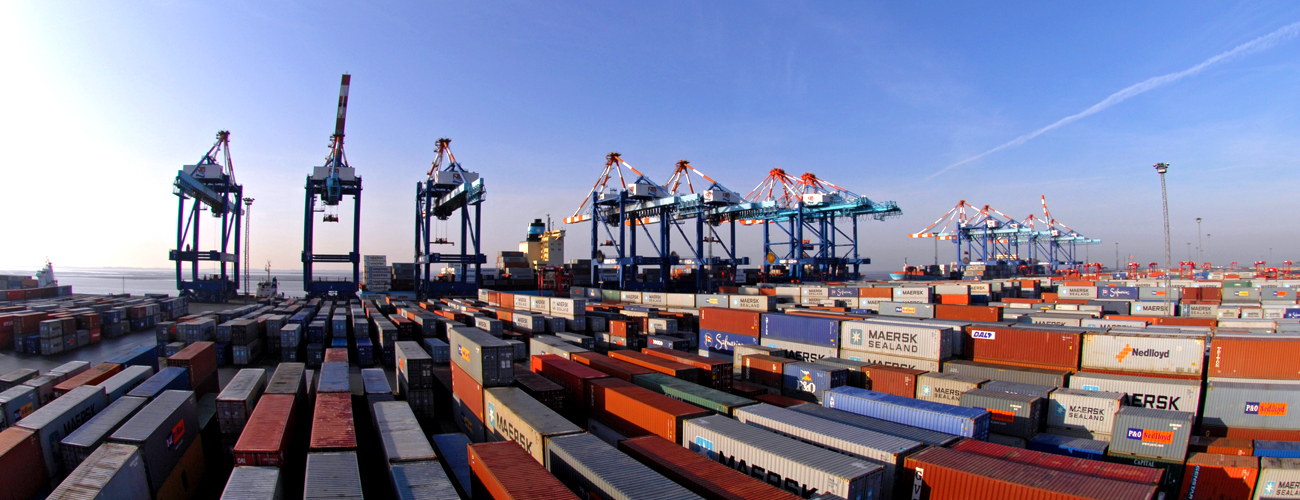Maritime economy and logistics
Maritime economy and logistics: two traditional Bremen industries that have a big future
In terms of its geography, economy and its culture, the Bremen region has close connections with the sea. Thanks to its favourable location on the Weser river and North Sea and its centuries of history as a Hanseatic trading power, Bremen has become of the most important locations in Germany and around the world for the maritime economy. The fourth-largest container port in Europe (second-largest in Germany) handles huge volumes of goods, which are processed and transported by some 40,000 people working for more than 1,300 companies across Bremen and Bremerhaven.
The maritime sector accounts for more than 30 per cent of Bremen's economy. It is a pillar of the local and regional economy and is hugely important for the rest of Germany and for Europe as a whole. The Bremen ports are a key hub for intercontinental trade and are driving growth in the maritime sector.
More on this in our privacy policy.
Five northern German states – one maritime cluster
Northern Germany's maritime cluster (Maritimes Cluster Norddeutschland, MCN) is a unique maritime network that brings together strong partners as well as more than 250 members from the fields of business and research. It has at its disposal a broad range of maritime expertise covering every aspect of the value chain.
Andreas Born
Ministry of Economic Affairs, Ports and Transformation
Maritimes Cluster Norddeutschland and Industry 4.0
+49 (0) 421 361-32171
- Civil maritime security: promoting innovation and the development of new markets
- Sustainable shipping: network promoting innovation and sustainable solutions in the maritime economy
- Shipbuilders and their suppliers: innovative shipbuilding industry with more than 250 companies and institutes
- Marine science: facilitating the transfer of knowledge between business and academia
- Maritime/marine technologies: helping companies to capitalise on new opportunities in the market
- Northern Germany's maritime cluster: pooling the maritime expertise of Germany's five coastal federal states
Numerous research organisations, institutes and networks play a key supporting role in the maritime economy and together form a unique innovation cluster.
Logistics is another key part of the economy in Bremen. Bremen's ports offer a total of 1,486 hectares of logistics space. This outstanding infrastructure is ideal for companies looking to establish operations in the region. Five logistics centres with different specialisms and more than 1,300 companies with 20,000 employees help to transport goods seamlessly from A to B.
The proximity of the production sites to the ports, the outstanding infrastructure, the geographical location and the logistical capacities are just some of the advantages that Bremen has to offer. Bremen is one of the world's foremost shipping and transportation hubs. Its cargo distribution centre, meanwhile, is the largest in Germany and the second biggest in Europe. Bremen is also home to Europe's biggest warehouse.
Success Stories
10 Leading Coffee Companies from Bremen
From trading to roasting to logistics – no one does coffee quite like Bremen. But who are the players driving the business in Germany’s coffee capital? Meet ten of them.
Learn moreProfile of Bremen's eight ports
Bremen's ports are the engine that drives economic activity throughout the region. But do you know which goods arrive and depart, and where? We have taken a look around the eight port complexes in Bremen.
Learn moreThe Polymath from Horn-Lehe
No can do? No such thing! GERADTS GMBH makes the things other companies can’t even imagine. This is why this engineering firm is so firmly rooted in major European aviation and aerospace projects, and also in a myriad of other sectors.
Learn more



